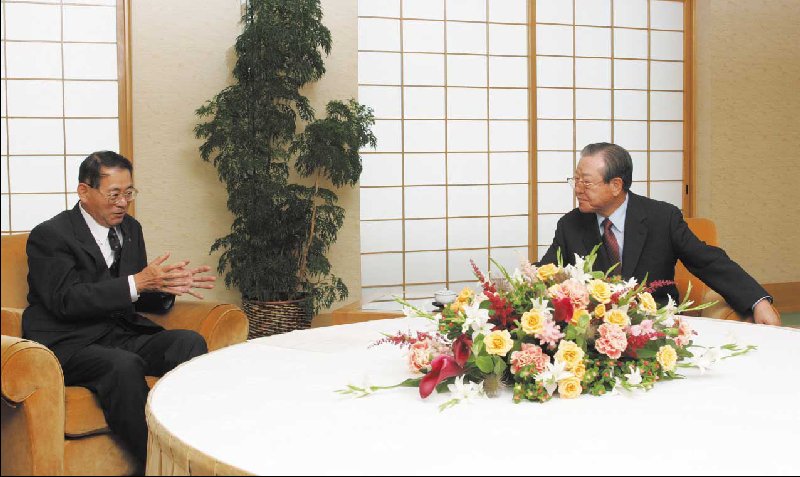

The Hon. Kim Jong-pil, who served as party leader of Korea's United Liberal Democrats, gave a talk in a lecture meeting sponsored by Kyushu University during his visit to Fukuoka in June. Mr. Kim played a major role in the negotiations that led to the signing of the Treaty on Basic Relations Between Japan and the Republic of Korea. During the presidencies of Mr. Park Chung-hee and Mr. Kim Dae-jung, he was appointed Prime Minister, and became a part of a political regime called the Three Kims' Era. Today, amicable relations between the people of Korea and Japan have reached a level unseen in the past. In the 21st century, we are responsible for building a new era of friendship. We asked Mr. Kim Jong-pil, who was awarded an honorary doctorate from Kyushu University, what we should hand down to the next generation from the histories of the two countries, and how the next generation should expand on these in the future.
Kajiyama: Thank you very much for interrupting your busy schedule to attend today's lecture meeting at Kyushu University. Attendants from the general public as well as about 500 high school students are keenly interested in hearing what you have to say.
Kim: Well, I don't know if my message will be of any use to young people. However, since I am here, let me speak from my past experience.
Kajiyama: In 1998, when you came to Kyushu University and delivered a lecture in Japanese entitled the "Past and Future of Korea and Japan," over 2000 faculty members and attendants from the general public were deeply moved. Since then, we have engaged in various projects, such as the establishment of the Center for Korean Studies as a base for academic and cultural exchange with South Korea. In that respect, your lecture initiated the foundation for the research on South Korea in this university. Of the approximately 2,800 new students enrolled in our university this spring, 14% or 383 students are taking a Korean lanKYUDAI NEWS 6 guage class. I feel the distance between Japan and Korea is getting shorter and shorter every year. First of all, can you tell us something about your childhood? How did you spend your childhood years? What triggered your desire to enter the world of politics?
Kim: As a child, I was somewhat of a rascal and a troublemaker in the village I grew up in. For example, when a new house was being built, I would take 12 to 13 of my friends, make a mess of the construction site, and leave its pillar dirty. We pulled a lot of mischievous pranks. After entering junior high school, however, I became studious and even served as class president.
From the road to becoming a teacher to the road to becoming a politician
Kajiyama: It is said that children who are rascals usually grow up to become important persons in the future. So how did this rascal become interested in politics?
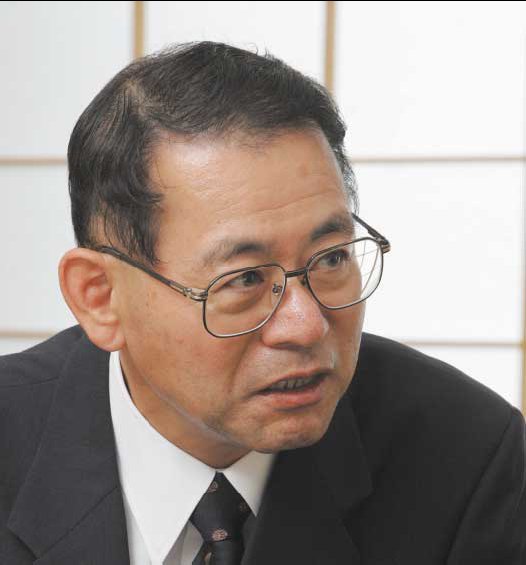 Kim: Since I was young, my goal had been to become a high school teacher, so I enrolled in a Teachers College. I had never thought of becoming a politician. Unfortunately, Korea divided into two countries, North and South, and a year after I graduated from the Military Academy, which I had entered after graduating from the Teachers College, the Korean War broke out and I joined the war as a soldier. More than 30% of my classmates from the Military Academy died as platoon leaders and company commanders. By the end of the war, the whole country was ruined. There was no food, and we had to depend on surplus agricultural products from the US and wait for the harvest in spring. We were pitifully poor. It was in 1961 that we finally stood up to build the country back. In May of that year, we staged a military coup. We gathered the armed forces and took over the government. It was at that time that we decided, since we were the ones that started the coup, we should be responsible in rebuilding the finances of the country and to rebuild the country. This is what made me change my mind and decide on becoming a politician. It was the coup that triggered changes and moved the country toward what we are today. Last year our export performance exceeded 250 billion dollars. We are now a country that builds automobiles and uses them! It was that coup that was the starting point and the turning point for our country. Forty-three years have passed since I became a politician. I retired from the political world last year. Considering my age being 80, I am just too old for politics. It is time to give the job to young people.
Kim: Since I was young, my goal had been to become a high school teacher, so I enrolled in a Teachers College. I had never thought of becoming a politician. Unfortunately, Korea divided into two countries, North and South, and a year after I graduated from the Military Academy, which I had entered after graduating from the Teachers College, the Korean War broke out and I joined the war as a soldier. More than 30% of my classmates from the Military Academy died as platoon leaders and company commanders. By the end of the war, the whole country was ruined. There was no food, and we had to depend on surplus agricultural products from the US and wait for the harvest in spring. We were pitifully poor. It was in 1961 that we finally stood up to build the country back. In May of that year, we staged a military coup. We gathered the armed forces and took over the government. It was at that time that we decided, since we were the ones that started the coup, we should be responsible in rebuilding the finances of the country and to rebuild the country. This is what made me change my mind and decide on becoming a politician. It was the coup that triggered changes and moved the country toward what we are today. Last year our export performance exceeded 250 billion dollars. We are now a country that builds automobiles and uses them! It was that coup that was the starting point and the turning point for our country. Forty-three years have passed since I became a politician. I retired from the political world last year. Considering my age being 80, I am just too old for politics. It is time to give the job to young people.
At the peak of negotiations for war compensation from Japan
Kajiyama: You are the most knowledgeable person on the current state of Japan and you show amicable feelings for our country. That is the impression I have of you. You had been putting a lot of efforts into correcting the distortion in the relationship between Japan and South Korea, as well as building strong ties between the two countries. Will you share with us some of the memorable events during this period in your life?
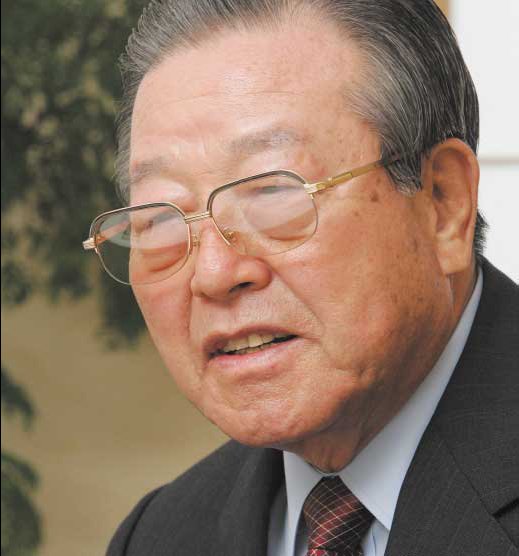 Kim: With the San Francisco Treaty in 1951, South Korea and Japan were set to seek solutions to the issues through formal discussions. Representatives from the two countries immediately began negotiations. However, over the following 10 years, up to 1961, we were not able to bring about any results. It was because Japan was also recovering from the scars of war, and Korea couldn't think of anything else but to feed itself and to rebuild the country. Furthermore, we were constantly under threat from North Korea. With all these problems at hand, improving the relationship between the two countries was pushed aside. The biggest key issue was the monetary compensation for Japan's past treatment of Korea. The right to claim compensation from Japan for its 36 years of colonial rule in Korea is indisputable. However, representatives did not even once touch upon the specific amount of compensation during the negotiations in those 10 years. During the negotiations, we pounced on each other's words, quarreled, and the discussion always ended up being suspended. So even though we had five formal discussions, none of them brought about any kind of resolution. Then Mr. Park Chung-hee (the Supreme Council for National Reconstruction at that time) said to me that, since I had been able to start a coup, wouldn't I try my hand at the negotiating table? With a high sense of motivation in my heart, I entered into discussions with Mr. Masayoshi Ohira, the Minister of Foreign Affairs of Japan at that time; and in November of 1962 we finally agreed on the so called Kim-Ohira memo, which stipulated 300 million dollars of voluntary compensation and 200 million dollars of onerous compensation in financial support. I would say that it was this agreement that opened the door to the Japan- Korea Treaty that was signed three years later.
Kim: With the San Francisco Treaty in 1951, South Korea and Japan were set to seek solutions to the issues through formal discussions. Representatives from the two countries immediately began negotiations. However, over the following 10 years, up to 1961, we were not able to bring about any results. It was because Japan was also recovering from the scars of war, and Korea couldn't think of anything else but to feed itself and to rebuild the country. Furthermore, we were constantly under threat from North Korea. With all these problems at hand, improving the relationship between the two countries was pushed aside. The biggest key issue was the monetary compensation for Japan's past treatment of Korea. The right to claim compensation from Japan for its 36 years of colonial rule in Korea is indisputable. However, representatives did not even once touch upon the specific amount of compensation during the negotiations in those 10 years. During the negotiations, we pounced on each other's words, quarreled, and the discussion always ended up being suspended. So even though we had five formal discussions, none of them brought about any kind of resolution. Then Mr. Park Chung-hee (the Supreme Council for National Reconstruction at that time) said to me that, since I had been able to start a coup, wouldn't I try my hand at the negotiating table? With a high sense of motivation in my heart, I entered into discussions with Mr. Masayoshi Ohira, the Minister of Foreign Affairs of Japan at that time; and in November of 1962 we finally agreed on the so called Kim-Ohira memo, which stipulated 300 million dollars of voluntary compensation and 200 million dollars of onerous compensation in financial support. I would say that it was this agreement that opened the door to the Japan- Korea Treaty that was signed three years later.
What was it that made you what you are today?
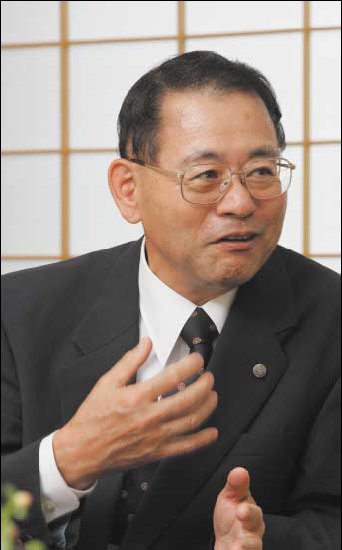 Kajiyama: Thereafter you served as Prime Minister under the Park Chung-hee and Kim Dae-jung administrations. Being in a position of responsibility for important decisions of the country, I assume you were under a great pressure. Will you share with us the things you kept foremost in mind when making your decisions during your time of Prime Minister? What was the backbone of your decision making process? It may be useful to young students today, who find decision making a difficult task.
Kajiyama: Thereafter you served as Prime Minister under the Park Chung-hee and Kim Dae-jung administrations. Being in a position of responsibility for important decisions of the country, I assume you were under a great pressure. Will you share with us the things you kept foremost in mind when making your decisions during your time of Prime Minister? What was the backbone of your decision making process? It may be useful to young students today, who find decision making a difficult task.
Kim: It was really simple for me. I wanted to guarantee a fulfilling life without putting too much burden on the people of my country. How should a country move to ensure food for all people, to ensure democracy, to gain respect and be valued as a member of the world community? How should I lead those to the future? These were the questions for which I was constantly searching answers.
Kajiyama: How did you foster your tenacity and compassion for others in your youth?
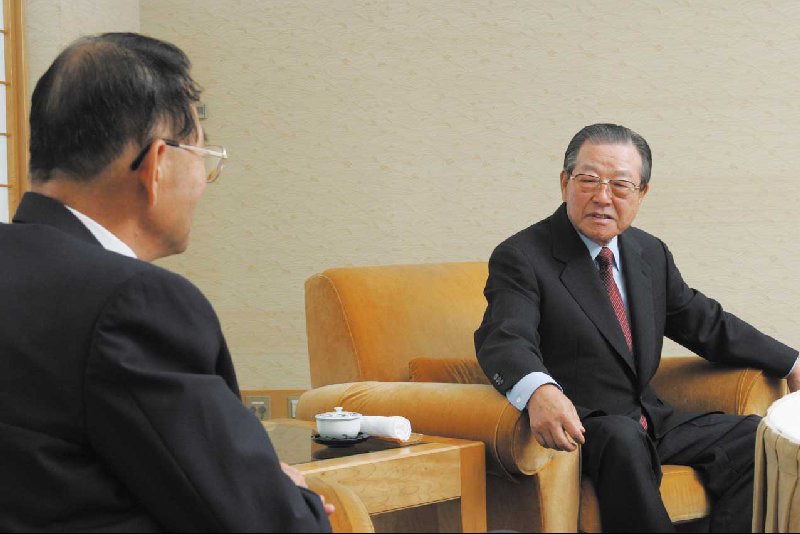
Kim: I received the kind of education that taught me to make decisions with consideration for others, rather than pushing my ideas and position on others, or thinking only of my convenience. I think it was this that fostered my tenacity and compassion. When I was in my teens, I read many historical books and biographies of great men all night long. It is impossible to make clear judgment about today without holding yesterday as a mirror for comparison. This comparison must also be kept in mind when we look toward tomorrow. I really think this is an important point.
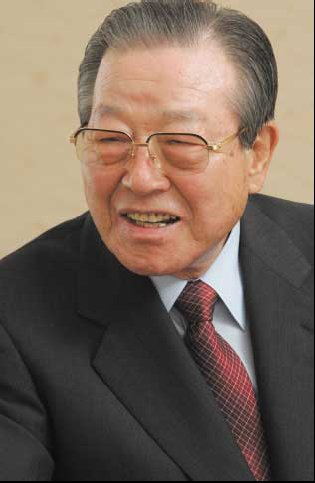 Kajiyama: We should not only read historical books but also read outstanding literature to understand each other's countries. And these kinds of actions must come voluntarily.
Kajiyama: We should not only read historical books but also read outstanding literature to understand each other's countries. And these kinds of actions must come voluntarily.
Kim: I know a French joke. There was this wife who used to be an avid reader in her youth, yet stopped reading completely after getting married. When asked, "Why don't you read anymore?" she answered, "but TV does all the reading for me." But the fact is that things read by or shown by others will never leave anything in the mind of that person or lead to deepening the person's knowledge. It is important to take in information through your own eyes and ears. When I was in the 3rd year of junior high school, I read through the complete masterpieces of World Literature. I was living in a dorm at the time, and lights were turned off at 10pm. After that I used a flashlight with batteries made in Japan to read. I couldn't have lived without batteries made in Japan in those days.
Kajiyama: As people said in olden days, "Hotaruno Hikari, Mado no Yuki (Studying by the light from the fireflies and the glare from the snow by the window)."
Kim: It's also said "Keisetsu no ko (fruits of diligent work)." But what I'm worried about today is that young people study and study but forget about training themselves. Since they are not mentally well-trained, I find them to lack willpower and guts. I have been taking Kendo since the 4th grade. I always attended Saturday training, mid-winter training, morning and late afternoon trainings. I was never absent. I hold the 6th Dan in Kendo, and I don't have any problems with my body at this age.
Kajiyama: There is a saying, "Strike while the iron is hot." I see that it is important that people train their body and soul during their youth.
As good friends, good neighbors, and good partners
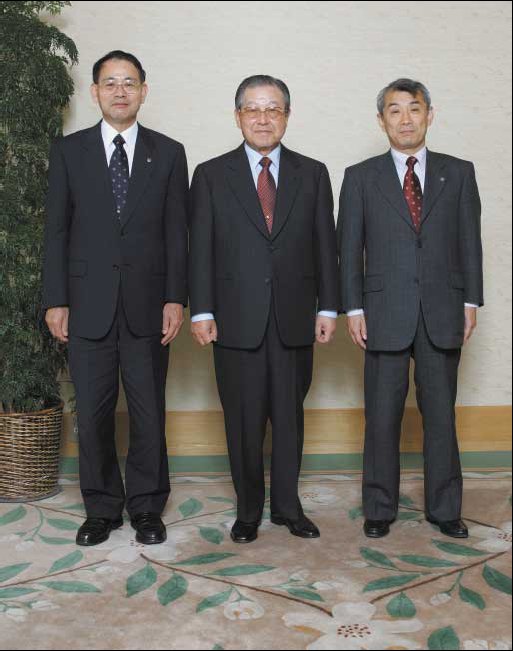 Kajiyama: Japan is moving away from the conventional standardized education toward individualized education, a reflection of the fact that education changes along with the changes of society. On the other hand, it never changes that education to foster tenacity and compassion for others is necessary in all countries and at all ages. Japan and South Korea are now experiencing active interactions through music, television, movies, and sports. At the same time, we have many more opportunities to learn about each other. That is the reason we should share history with the youth of both countries. If we don't, we will be losing out on an opportunity to really understand each other.
Kajiyama: Japan is moving away from the conventional standardized education toward individualized education, a reflection of the fact that education changes along with the changes of society. On the other hand, it never changes that education to foster tenacity and compassion for others is necessary in all countries and at all ages. Japan and South Korea are now experiencing active interactions through music, television, movies, and sports. At the same time, we have many more opportunities to learn about each other. That is the reason we should share history with the youth of both countries. If we don't, we will be losing out on an opportunity to really understand each other.
Kim: Relations between Japan and South Korea have been complicated by many ups and downs in the past. However, we are in the position to be good friends in the future. I truly hope that young people will think seriously about being good friends, good neighbors, and good partners throughout their lives, and open up a brighter tomorrow for both countries.
Kajiyama: Mr. Kim, thank you very much for joining with us today and giving us the benefit of your wisdom.
Previous PageTop Next